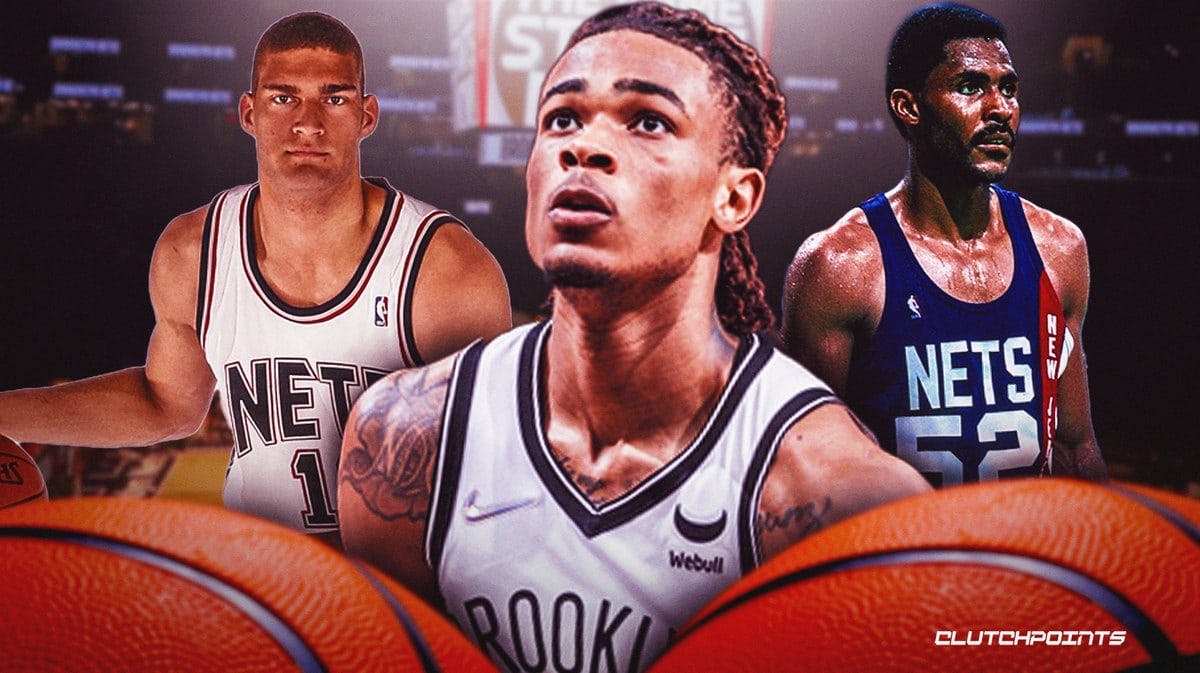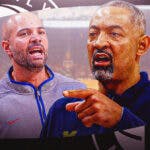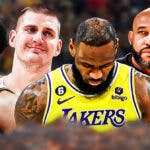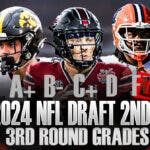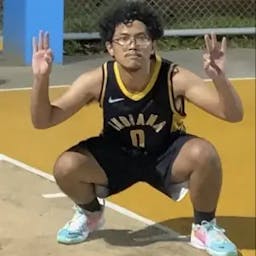The Nets franchise may have a championship to their name, but that came during their days in the ABA. Since the merger in 1976, the Nets have yet to add to that championship banner, although it hasn't been for a lack of trying. Throughout their 56 years of existence thus far, the Nets have had a few opportunities to win a championship. But they haven't exactly taken a number one option on a championship team kind of player in the NBA Draft.
Even then, the Nets have made a few quality draft picks in their time — mostly big men who have fashioned (or will fashion) lengthy NBA careers for themselves, even if it may not have landed them in the Naismith Memorial Basketball Hall of Fame. With that said, here are the 10 best draft picks in Nets franchise history.
10. Jarrett Allen
It could not have been easy for the Nets to witness their pick in the 2017 NBA Draft end up being the first overall selection, as it ended up in the hands of the Boston Celtics thanks to the disastrous Paul Pierce/Kevin Garnett blockbuster in 2013. But it became a much easier pill for them to swallow when they nailed one of their two first-round picks in 2017, drafting Jarrett Allen using the pick they acquired in their Bojan Bogdanovic trade with the Washington Wizards.
Allen quickly stood out as a towering athletic presence for the Nets in the paint, catching lobs and even swatting the likes of LeBron James at the rim. He played himself into seemingly being a part of the Nets' core for years to come, but when the opportunity to trade for James Harden came along, the Nets traded him away, cutting his Brooklyn tenure short at 3.5 seasons.
9. Chris Morris
The Nets left a lot of future stars on the board when they selected Chris Morris with the fourth overall pick of the 1988 NBA Draft. But Morris cannot control where he would be taken; he could only control how well he plays, and to his credit, he put up a few years of solid production for the Nets.
He was a starter for the Nets for the greater part of seven years, putting up 13.3 points and 5.7 rebounds per game in 510 games (399 starts) for the franchise.
8. Mike Gminski
Not too many casual fans have heard of Mike Gminski's name, as he didn't exactly leave much of a mark during his 14-year run in the NBA. But Gminski is certainly an underrated piece who strung together a few quality seasons for the Nets to the point that he's worthy of inclusion on this list.
Gminski spent 7.5 seasons with the Nets, averaging 11.7 points, 6.7 rebounds, and 1.7 blocks in 550 games with the team. There were a few better options on the board for when the Nets made their pick (Andrew Toney, Kiki Vandeweghe, among others), but Gminski was a starting-caliber player for the Nets for years — not too shabby of a return.
7. Nic Claxton
Nic Claxton hasn't had the longest time as a high-impact player for the Nets. But given where the Nets took Claxton, the 6'11 big man has repaid the franchise's selection of him in spades. The 2022-23 season was a true breakout for Claxton, as he became a legitimate Defensive Player of the Year candidate, putting together all his physical tools into one cohesive, elite defensive package.
Claxton is only 24 years old, so the sky is the limit for the Nets center. He figures to be a huge part of the team moving forward as the team recovers from its failed superteam attempt with Mikal Bridges and Cameron Johnson leading the way. However, he'll soon be commanding huge money from the Nets, as he'll be entering unrestricted free agency at the conclusion of the 2023-24 season.
6. Kerry Kittles
The Nets, like a few other teams, had the opportunity to take a chance on the youngster out of Lower Merion, Kobe Bryant, during the 1996 NBA Draft. However, like a few other teams, they opted to take a safer option, instead drafting Kerry Kittles, the shooting guard who played four years in Villanova.
At the very least, the Nets drafted themselves a quality piece whose game would translate much better had he played in today's NBA. Kittles was a perimeter-oriented player who could have flourished if he had more green light to let it fly from deep. He was also fairly sturdy defensively, and he was the archetype of player that every contending team needed.
Kerry Kittles, however, would suffer injury problems that derailed his career, but not before contributing meaningfully for the Nets during their run to the NBA Finals in the early 2000s.
5. Kenny Anderson
Young guards always tend to be projects as they enter the league, as it takes time to adjust to the speed of the game in the NBA as well as navigate the nuances of what makes for a high-level floor general. In Kenny Anderson's case, this was certainly the truth. Anderson, despite being selected with the second overall pick of the 1991 NBA Draft, had a putrid rookie season that had many calling him a draft bust. Adding to the sting was the fact that Dikembe Mutombo and Steve Smith (taken fourth and fifth in the same draft) had immediate impacts as rookies, with Mutombo even making the All-Star team.
In the end, Kenny Anderson developed into a quality point guard, even making the All-Star team during his third season in the league. He averaged 15.3 points, 7.8 assists, and 1.6 steals in five seasons (304 games) for the Nets.
4. Derrick Coleman
The Nets have won the first overall pick twice in their history, and both times, they used those selections to draft a future All-Star power forward. Derrick Coleman was one of those players, and even though the Nets missed out on a much better player taken right after Coleman (Gary Payton), it's difficult to rag on them too much for this selection, as the 6'10 power forward was very productive to begin his NBA career.
Coleman averaged 18.4 points, 10.3 rebounds, and 2.3 combined steals and blocks (stocks) per game during his rookie season, impressive numbers especially for a rookie. But Coleman didn't exactly transform the franchise, as the team barely improved even with the first overall pick putting up those gaudy stats.
Derrick Coleman was a good player, make no mistake about it, as he averaged 19.9 points and 10.6 rebounds as a member of the Nets organization for five seasons. But he was the kind of player who was at his best in a complementary role, a second or third option who thrives off of a bigger star. And during his time with the Nets, Coleman didn't exactly have that kind of player alongside him, as he shared the offensive burden with Kenny Anderson. Coleman, however, would end up peaking with the Nets, as a combination of injury woes and off-court issues ended up cutting his prime prematurely.
3. Kenyon Martin
Despite winning the first overall pick in what many believe is the worst draft class of all time, the Nets came away with one of the few quality players during the 2000 NBA Draft in Kenyon Martin, a dynamic frontcourt presence who imposed himself on the glass as well as tower over plodding big men thanks to his elite athleticism for the position.
And as fate would have it, Martin would soon team up with Jason Kidd after the Nets traded away Stephon Marbury to the Phoenix Suns for the Hall of Fame floor general. This would help unlock Martin as a winning player, as someone who can do the dirty work in an egalitarian offense that made the most out of their key pieces, including Keith Van Horn, Kerry Kittles, and Richard Jefferson. Kidd made everything sing, and the Nets ended up making the NBA Finals for two consecutive seasons — with Martin saddled with the thankless task of dealing with Hall of Famers such as Tim Duncan and Shaquille O'Neal for stretches of that Finals run.
Kenyon Martin wouldn't last long with the Nets, as the team dealt him away in a sign-and-trade that brought back three first-round picks that the franchise wasn't able to maximize. But he was as crucial of a piece there was for the Nets during the franchise's heyday in the early 2000s. And sometimes that matters more than raw statistics or accolades — as Martin played an important supporting role for a Nets team that ended up being the cream of the crop in a weak Eastern Conference to start the 21st century.
2. Brook Lopez
It's downright incredible how Brook Lopez, now of the Milwaukee Bucks, was able to transform his playstyle to keep up with the demands of the position in the current NBA. Lopez is now one of the best rim protectors in the league, even challenging Jaren Jackson Jr. for the Defensive Player of the Year award last season, and he is also the perfect frontcourt partner for the rampaging Giannis Antetokounmpo, as he can also space the floor quite well for his size.
But when the Nets drafted Lopez in 2008, his game could not have been farther than where he is now. Lopez's offensive game was heavily reliant on the back to the basket game, and he didn't exactly earn himself a reputation for being one of the best rim protectors during the early 2010s despite his gaudy block numbers. But Lopez was a deadly scorer, a bruising presence who can hit midrange jumpers in the faceup game and someone who can confuse defenders with his soft touch around the hoop.
For years, Brook Lopez was a featured presence in the Nets offense, proving to be the team's most reliable presence even as they tried to build a superteam with Deron Williams, Joe Johnson, Paul Pierce, and Kevin Garnett. And he delivered on most occasions, breaching the 20-point mark in two full seasons (and two other seasons in which he played a combined 24 games) before the Nets traded him away to the Los Angeles Lakers for D'Angelo Russell.
Lopez ended his Nets tenure as the franchise's all-time leading scorer by a measly four points over the greatest pick the franchise has ever made in its history — Buck Williams.
1. Buck Williams
Expectations are always high for players taken early in the NBA Draft. This was certainly the truth in Buck Williams' case, especially when the Nets took him after Mark Aguirre and Isiah Thomas — two players who would go on to win major accolades in their respective NBA career, with the latter even turning himself into one of the greatest point guards the league has ever seen. Nevertheless, Williams helped right the ship in New Jersey, as his arrival proved to be one of the biggest catalysts in their 20-win turnaround during his rookie season.
Williams also earned an All-Star nomination during his rookie season, vindication that the Nets made the best possible pick they could have during the time. And for years, he was as rock solid as it's gonna get, notching seven straight double-double seasons to begin his career in flying colors.
In eight seasons with the Nets, Buck Williams averaged 16.4 points and 11.9 rebounds, giving the team a major interior presence during an era in which every aspiring playoff team needed bodies that were capable of banging on the interior. He was also one of the best defensive anchors of his time, protecting the paint well for the Nets during their five-year playoff streak in the 1980s.
Even though Williams' raw production had declined by the late 1980s, he was still as impactful as it's gonna get for a winning team. The Nets, however, simply weren't that team anymore. When the Nets traded away Williams to the Portland Trail Blazers in 1989, the 6'8 big man helped transform the Clyde Drexler-led team into a more well-rounded and cohesive unit — turning them into championship contenders in the process.
It's quite a shame that the Nets were not able to build a team that was able to maximize Buck Williams' strengths, as he proved capable of being a core piece for a team that was good enough to threaten for a title.
